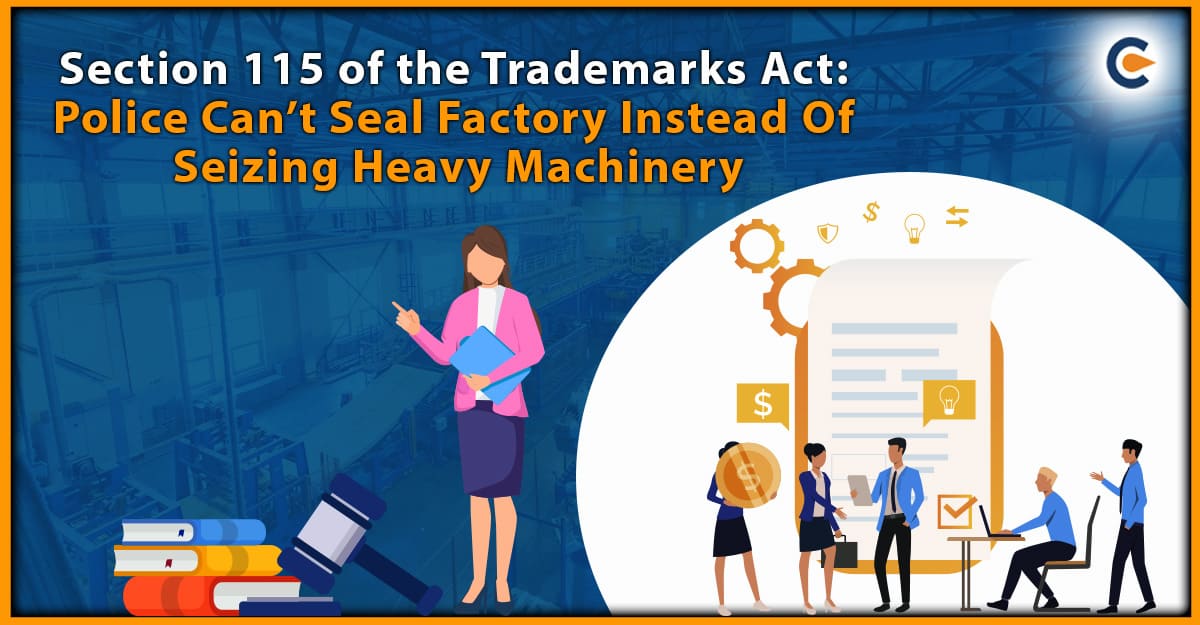In the case of Mahendra Dattu Gore vs the State of Maharashtra, the Bombay High Court directed that police cannot seal any factory premises. Instead, they only have the power to seize heavy machinery. Now, the powers of police officers for search and seizure are given under Section 115 of the Trademarks Act. In this blog, we will understand the powers of police as mentioned in the Trademarks Act, along with knowing the main provisions of the judgement delivered by the Bombay High Court according to the powers of office to search and seizure.
Understanding Section 115 of the Trademarks Act, 1999
Section 115 of the Trademarks Act, 1999 specifically talks about the Cognizance of certain offences. Furthermore, it also specifies the powers of police officers in regard to search and seizure.
- No court may declare a violation of Sections 107, 108, or 109 to have occurred unless it receives a written complaint from the Registrar or another officer duly empowered by him. Provided that, with regard to sub-section (1) of section 107’s clause (c), a court must recognise an offence based on a certificate from the Registrar stating that a registered trade mark has been misrepresented as being registered for goods or services for which it is not actually registered.
- The cases concerning the matters under the Trademarks Act, 1999 shall be heard only in the court of Metropolitan Magistrate or Judicial Magistrate or their superior court.
- This section declares the offences listed under Sections 103, 104, and 105 to be Cognisable.
- A deputy superintendent of police and officer higher of equivalent to his position has the power to search and seize without a warrant any goods, article, block, plate, machine, and other instruments that were involved in the course of committing the crime. Such items wherever found must be sealed, and produced before a Judicial Magistrate as soon as possible.
The police officer must take the Registrar’s opinion before initiating any inquiry. Furthermore, as the police officer obtains the Registrar’s view on the circumstances surrounding the trade mark violation before conducting any search or seizure, he must abide by that decision. - Any person with interest in any item that has been seized in accordance with subsection (4) may, within fifteen days of the seizure, may appear before the Judicial Magistrate of the First Class or Metropolitan Magistrate, as the case may be, asking that the item within which the property will be returned to him. After hearing from both the applicant and the prosecution, the magistrate will decide how to proceed with the application.
Conflicting Provision
Section 115 (4) was a conflicting provision, and the court found that this provision allows the police officer to search and seize any item or article without the warrant of the magistrate. The court further added that this provision does not give power to the police officer to seize the factory premises without a warrant. This was noted by a vacation bench of Justice Sharmila Deshmukh and Arif Doctor.
Facts of the Case
Mahendra Gore was alleged by the police and was booked for committing offences listed under sections 420 of the Indian Penal Code, 1860 and Sections 103, 104 and 105 of the Trade Marks Act, 1999. While investigating, the police found incriminating machinery in the petitioner’s factory, and therefore, the police seized his factory. After sealing the property, Gore approached the Bombay High Court.
From the side of the petitioner, Advocates Rameshwar Totla and Rahul Totla, under the direction of Advocate Ashwin Poojari, argued that the police might confiscate the items, articles, blocks, machines, plates, and other items used in the crime without a warrant but not the factory itself.
Continuing the process, Advocate Ankit Nikam appeared from the side of the opposite party. He argued that, as specified under subsection (4), the police were allowed to seize the machinery. Still, as it was very heavy, it was impossible for the police officers to seize the machinery. In order to safeguard the machinery, they took the step of seizing the factory.
Observance and Judgement of the Bombay High Court
Considering the legal provisions, there is no provision under Section 115 of the trademarks act, 1999, which says that in case of incriminating machinery, the police have the power to seal the factory premises.
The court noted that in an ideal world, the confiscated items would have to be brought before the magistrate in response to the initial complainant’s argument that an alternative remedy was available before the judicial magistrate’s first class. The issue of an alternate remedy does not arise since the goods were not presented.
Furthermore, as a part of interim relief, the court ordered for de-sealing of factory premises in Chakan, situated near Pune. The court further noted that Section 115 of the Trademarks Act does not empower police authorities to a factory or property where the incriminating property was found.
Understanding A Few Legal Provisions Present In This Case
There are certain sections that were an issue in this case. Let’s understand them:
- Section 103 of Trademarks Act, 1999
This section talks about the penalty that must be granted to an individual involved in applying false or incorrect trademarks or trade descriptions to any goods or services.
- Section 104 of the Trademarks Act, 1999
Section 104 specifies a penalty for those involved in selling or distributing the goods or rendering services on which a false trade mark or trade description is applied.
- Section 105 of Trademark Act, 1999
This section charges the individual with an enhanced penalty for a subsequent conviction. This means that if any person is convicted for a second time or subsequently for committing the offences mentioned under Sections 103 and 104 shall be charged with an enhanced penalty.
- Section 420 of the Indian Penal Code, 1860
The punishment for dishonestly inducing someone to deliver the property to another person, create, alter, or destroy a valuable security, or anything that is signed or sealed and can be converted into a valuable security, will be punished with imprisonment of either description for a term that may be as long as seven years, and fine.
Conclusion
The police have the power to search and seize the incriminating machinery, but as the Bombay High Court clarified in the case of Mahendra Dattu Gore vs the State of Maharashtra, that Section 115 of the Trademark Act, 1999[1] does not empower the police officer to seize the factory premises for any reason where such machinery was found.
Read Our Article: Overall Trademark Registration In India











